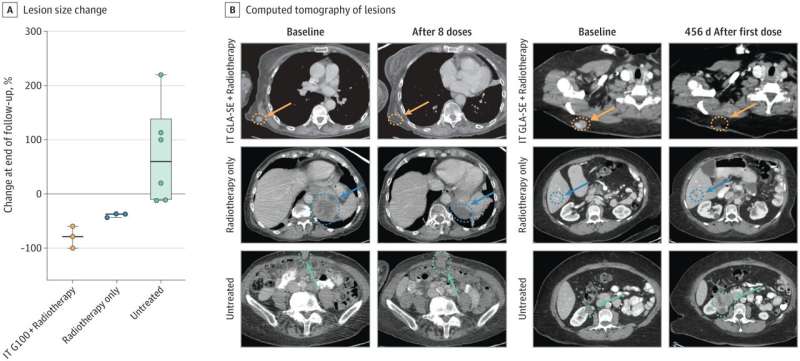This article has been reviewed according to Science X's editorial process and policies. Editors have highlighted the following attributes while ensuring the content's credibility:
fact-checked
peer-reviewed publication
trusted source
proofread
Combining immunotherapy and radiation in soft tissue sarcoma

Combining immunotherapy with radiation could be a promising treatment option for patients with advanced soft tissue sarcoma, according to the results of a clinical trial led by Northwestern Medicine investigators published in JAMA Oncology.
Advanced soft tissue sarcomas that can't be fully removed with surgery are usually considered incurable, according to the National Institutes of Health. Little progress has been made using current immunotherapies and overall survival time for patients with advanced soft tissue sarcoma is approximately two years, said Seth Pollack, MD, the Steven T. Rosen, MD, Professor of Cancer Biology, associate professor of Medicine in the Division of Hematology and Oncology, and senior author of the study.
After studying numerous tissue samples from his sarcoma patients, Pollack hoped to alter the immune environment of the tumors by introducing immunotherapy, which had been shown in previous research to alter T-cells and macrophages, two types of cells which are essential for the body's anti-tumor immune response.
"My lab is really interested in altering the tumor immune microenvironment to make immunotherapy work better," said Pollack, who is also the director of the Sarcoma Program at the Robert H. Lurie Comprehensive Cancer Center of Northwestern University.
"As part of that, we've been really interested in radiation as a way to sensitize tumors to immunotherapy. When we looked at patients who just had standard-of-care radiation, we saw that there were a lot more of some immune cells that we really want to have, however we also saw some cells that might be blocking the immune response."
In particular, a subset of macrophages that inhibited the body's immune response were present, Pollack said. Pollack and his investigators theorized that the immunotherapy glycopyranosyl lipid A (GLA) could activate the macrophages to work against the tumor, he said.
In the trial, investigators administered standard radiation therapy along with an injection of GLA to 12 patients with advanced soft tissue sarcoma. After eight doses, all patients achieved local control of their tumor, with one patient experiencing total regression of the tumor. Additionally, sequencing revealed that patients had an increased number of suspected anti-tumor T-cells following the treatment.
Overall, the treatment was well tolerated, with only one patient having experienced significant side effects.
"What we found was that the GLA really seemed to deepen the radiation response," Pollack said.
Because the study was a small pilot trial, another randomized study will be needed to fully understand the efficacy of the GLA treatment, Pollack said.
"We are looking for how we can expand this into a larger clinical trial and I think that it's also really important to think about how we might be able to take this and improve further with different combination therapies, especially cytokine therapies that might help to even boost this response further," he said.
More information: Yongwoo David Seo et al, Toll-Like Receptor 4 Agonist Injection With Concurrent Radiotherapy in Patients With Metastatic Soft Tissue Sarcoma, JAMA Oncology (2023). DOI: 10.1001/jamaoncol.2023.4015

















